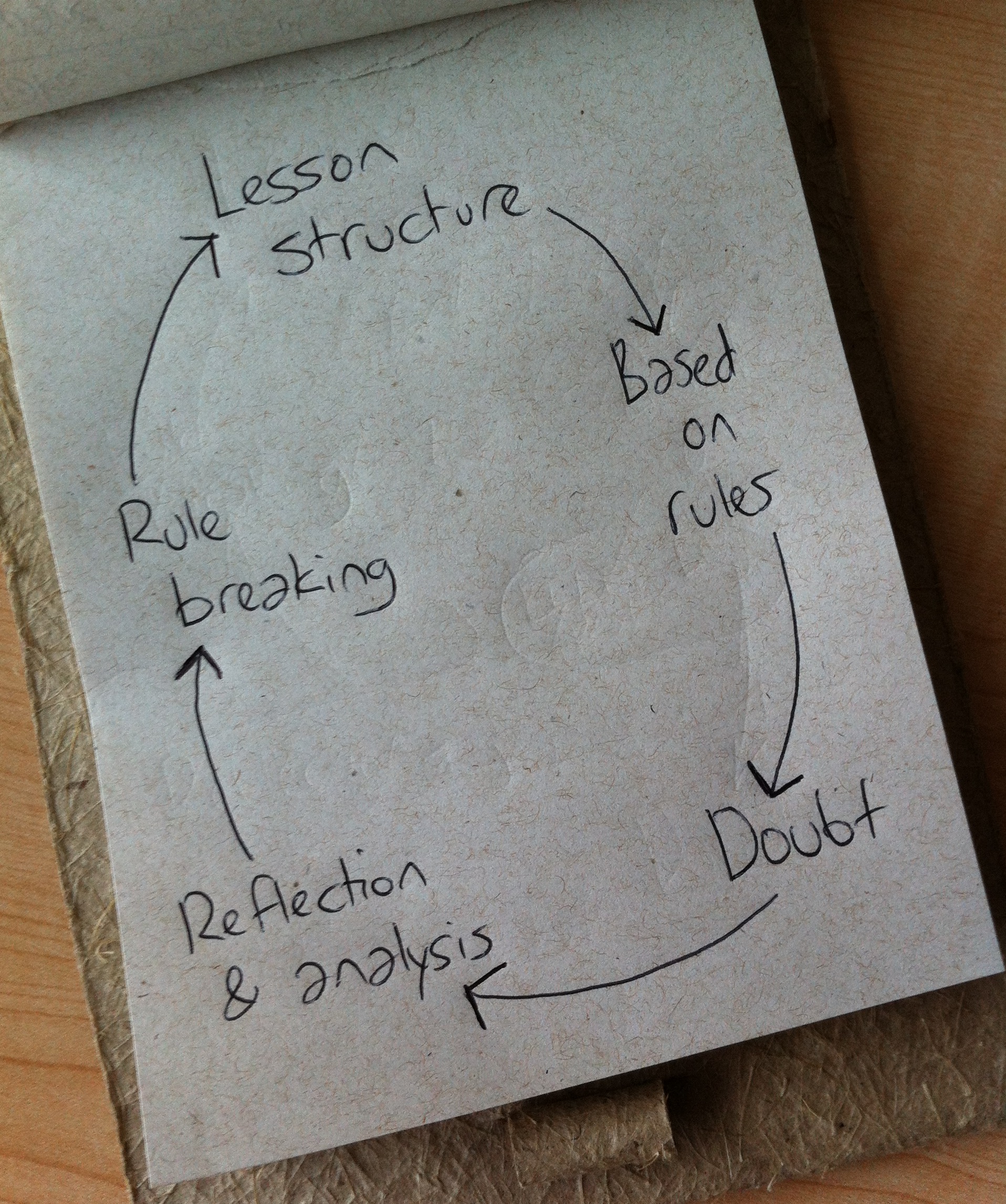 Unbreakable Rules of @TheTeacherJames – James Taylor
Unbreakable Rules of @TheTeacherJames – James Taylor
There’s been a lot of talk about breaking rules here on the iTDi blog recently, and while I completely agree that rebellious behaviour is necessary, I would argue that there have to be some rules that we must stick to. It’s the process of rule breaking and rule making that makes us better teachers.
As John Fanselow states in his excellent blog post here on the iTDi blog:
< https://itdi.pro/blog/2012/10/01/breaking-rules-john/ >
I do not advocate breaking rules to be different or distinctive but rather to explore
and I agree with him, but in this post, I’d like to say that:
I do not advocate following rules to be obedient or to fit in but rather to be principled.
Like John, I’m a bit of a rebel too, and I don’t like to have too many restrictions and impositions placed on my teaching from the outside. As far as I’m concerned, what happens in the classroom is an agreement between me and the learners.
However, there has to be some sort of structure to a lesson, which has to come from a source, whether that’s the teacher’s own principles, the rules as laid down by their institution or the structure as imposed by a coursebook. Simply put, there always have to be some rules for us to do our jobs effectively.
The problems arise when those rules become fixed and the teacher refuses to doubt them in order to improve themselves and their lessons. That’s where the rule breaking is required because it prevents atrophy and gives the teacher momentum to grow as a professional in their field.

The final stage, which completes the circle, is when this new found knowledge feeds back into the structure which the teacher believes will work for their students. And as this process continues, the teacher will acquire greater knowledge about themselves, their students, their materials, their institution and their profession, and some of these things will stick. They will become principles that the teacher believes they and their lessons embody. These should be an integral part of any teachers professional identity.
So while I am always questioning my classroom practices and evaluating what I’ve done in order to make the lessons better for my students, I also have my principles which remain. They aren’t fixed and I can’t promise I won’t change my mind about them in the future, but for now, these are my unbreakable rules:
1) It’s the students lesson, not mine.
2) The classroom is a place of work, communication and respect.
3) The learner knows why they are with me, and my job is to help them reach that goal. It’s not my job to tell them what their goal is.
4) Support the student as much as is possible. If they are not happy at the end of a course, it will not be due to a lack of commitment from me.
5) Never ask a student to do something I wouldn’t do myself.
6) The student must never be underestimated. Always dare them to achieve.
7) Never, ever, ever give a boring lesson.
8) Never stop breaking rules.

I agree with you completely. The students should be the focus of any lesson. Each classroom is different, because the needs of each students are different. There is no “cookie-cutter” way of teaching, which is the main failing of text-books.
The best way to teach acertain what the students and school want…unfortunately, they tend to be opposed much of the time…and find some happy medium.
Thanks Mike. You’re right, for now there is no ‘cookie cutter’ and we have to figure out the best way for ourselves based on our situation, experiences and beliefs, and then try to find that “happy medium”.
Dear Rebel,
Great post. Your thought, “I do not advocate following rules to be obedient or to fit in but rather to be principled” especially resonated with me. It took me a long time to realize that this concept seems to speak to the essence of teaching.
Since there are many ways to approach teaching, and different needs to be met in both context and for varying student levels, a successful teacher bases the decisions they make on their own principles.
I have explored this a great deal in terms of advocating that teachers develop their own Theory of Learning (TOL) and resulting Theory of practice (TOC). In simple terms, this means clearly defining your own ideas of “how people learn a language” and “what you do to help them learn”.
Thanks for sharing your ideas. I sure wish I could have read everyone’s thoughts 20 years ago when I was first getting started!
Cheers,
Steven
Thanks Steven for your comment. This is a very interesting idea to me:
“I have explored this a great deal in terms of advocating that teachers develop their own Theory of Learning (TOL) and resulting Theory of practice (TOC). In simple terms, this means clearly defining your own ideas of “how people learn a language” and “what you do to help them learn”.”
At the moment, we don’t know know how people learn a language (by this I mean what is happening cognitively in the brain and how to best create the conditions to enable this to occur), so until we do, this idea of having our TOL and TOC is all we have to go on.
I think all teachers do this, it’s what enables them to teach at all, but as I say in the post, it’s the process of how these ‘rules’ are put together that decides whether a teacher is progressing and developing as they teach, or merely repeating the same old ideology, and therefore lessons, over and over. If it’s not actively constructed, then it is passively, and that will ultimately lead to the students not getting what they’ve asked for and teacher stagnation.
Thanks for summing up it up so succinctly!